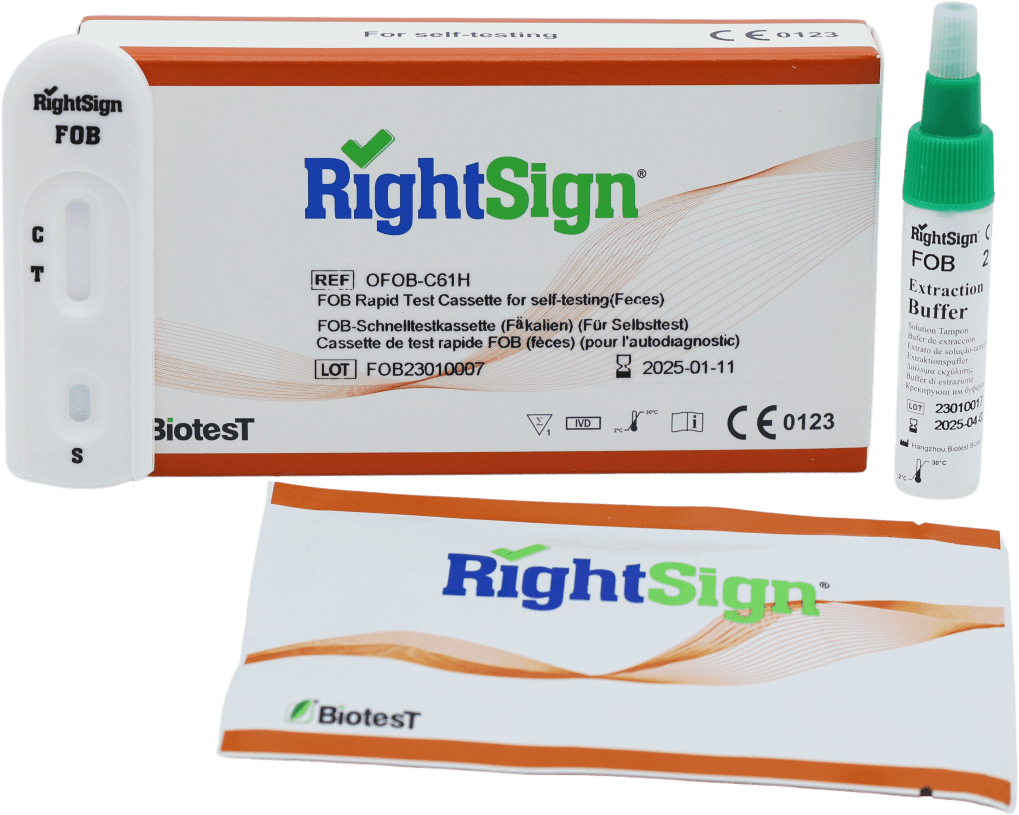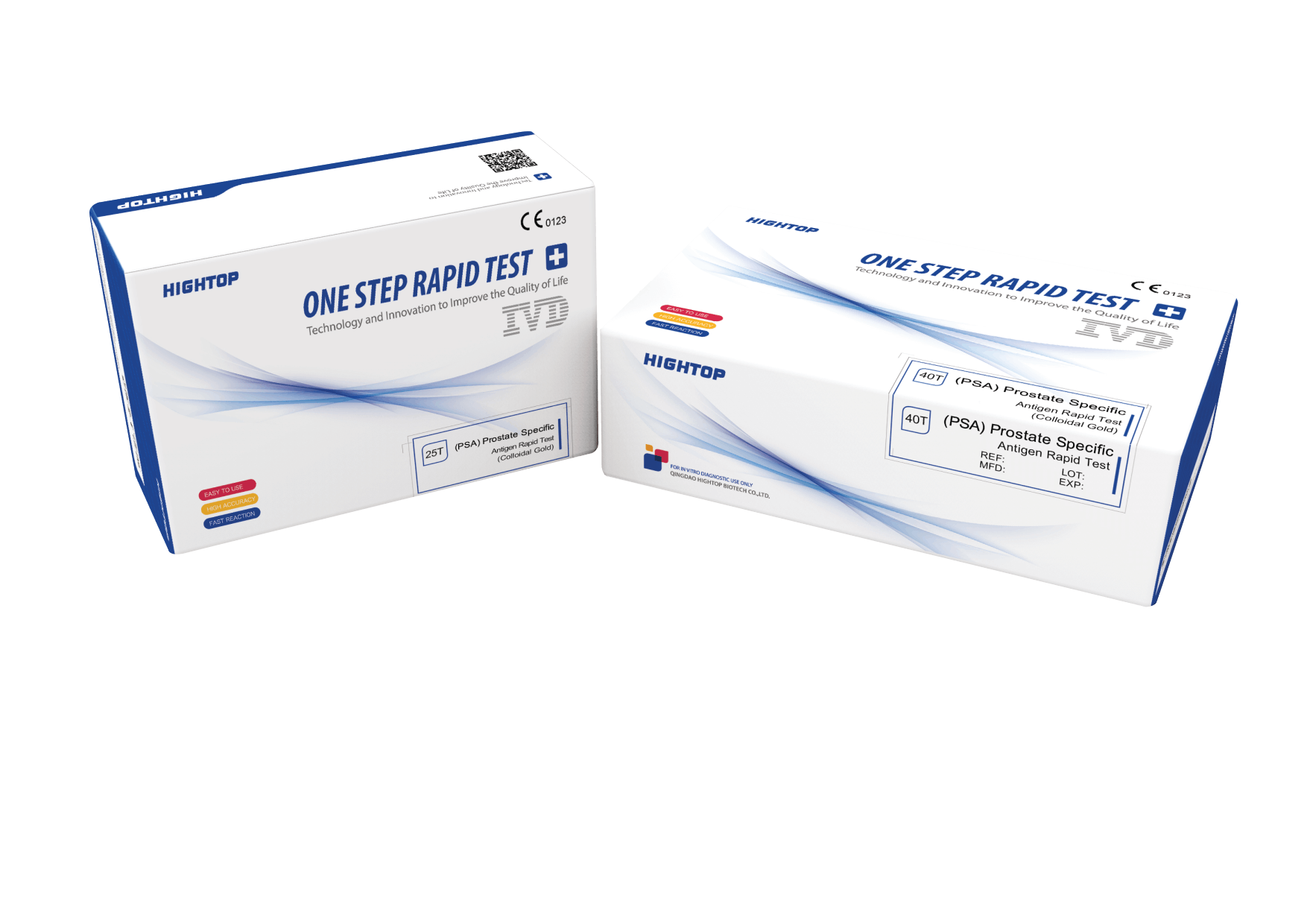Buy Tumor Marker Tests
Our tumor marker tests at OdemShop provide valuable support in diagnosing and monitoring various types of cancer. They are an essential tool for effective disease control.
Tumor markers - What they mean
Tumor markers are an important part of the diagnosis and treatment of cancer. They can help determine the severity of the tumor and monitor the effectiveness of therapy. But what exactly is a tumor marker? What are they used for and what are the risks? This article answers these questions and allows you to learn all about tumor markers so you can make informed decisions for your health.
What are tumor markers?
Tumor markers are biological substances that can be detected in the blood or other body fluids that result from cancer. They can be used to detect cancer in its early stages, track how the disease develops, and evaluate the effectiveness of treatment. Detecting the expression of certain protein characteristics in patient cells is another use for tumor markers. Markers such as CEA (conventional epithelial antigen) and CA 19-9 are commonly used in diagnosing certain types of cancer. Other markers help physicians track the progression of a disease as well as assess the effectiveness of treatment. These include PSA (prostate-specific antigen), AFP (alpha-fetoprotein) and beta HCG (human chorionic gonadotropin). There are many different types of tumor markers, which can vary depending on the type of disease. They can be used to obtain diagnosable patterns that can provide information about possible cancers.
What components do tumor markers consist of?
These markers can be made up of different components: humoral tumor markers, molecular diagnostics, cellular and folicular tumor markers. An example is medullary thyroid carcinoma, which is associated with the beta-HCG marker. Determination of these markers allows better understanding of disease symptoms and targeting of effective therapies. Therefore, the concept of tumor marker is of great importance in medicine. Researchers are therefore working on new methods to obtain even more precise results about the particular type of cancer.
With the right level of knowledge about tumor markers, it can help doctors to recognize signs of cancer earlier than they otherwise would and thus be able to treat it in time. Therefore, it is important to understand what information these biological substances provide; in this respect, they play a significant role in helping to avert serious disease incidence more effectively. Now that you have learned more about tumor markers, ask yourself: What are genes used for as tumor markers?
What are genes used for as tumor markers?
Genes are used as tumor markers to monitor the presence, progression and response of a tumor to treatments. They can also help diagnose certain types of cancer by identifying specific genes associated with certain tumors.
Tumor markers are recommended in many diagnostic guidelines and play an important role in prescribing diagnostic imaging tests. By analyzing the behavior of these genes over time, researchers have gained more insight into the biology of cancer and developed better methods to treat people with specific neoplasms. For this reason, it is imperative that genes be used as tumor markers to ensure effective treatment of disease.
When is a determination of tumor markers performed?
Elevated levels of tumor markers indicate a possible tumor. However, in some cases, there are exceptions with elevated levels that do not indicate cancer. Therefore, diagnostic guidelines should be used to properly diagnose the patient's condition and prescribe appropriate therapy.
In some cases, it may be necessary to test more than one tumor marker for certain types of cancer, especially when diagnosing malignant lymphoma or other solid tumor diseases. Also, certain benign liver diseases, chronic hepatitis B virus infections, and bile duct-related protein tests require the determination of tumor markers in combination with other tests to make an accurate diagnosis and appropriate treatment. Parathyroid hormone-related protein marker levels are particularly relevant to the diagnosis of parathyroid-related hypercalcemia.
Therefore, it is important to consider all potentially relevant parameters and check them several times, if necessary, in order to treat the patient's symptoms appropriately. All of this information can be used to determine what normal levels the tumor markers should have and whether abnormal levels are occurring, which could be possible signs of disease.
What are the typical ranges of tumor markers in the body?
Patients with breast cancer usually have lower levels of beta HCG and LDH than healthy people. Parathyroid hormone-related protein (PTHrP) are very high in patients with lung cancer, but there are no specific markers for tumors in other organs. Determining tumor markers is an important step in diagnosing a specific cancer, as the results can help better differentiate the type of cancer. Some of the most commonly used tumor markers are AFP (alpha-fetoprotein), CA 19-9 (carbohydrate antigen 19-9), CEA (carcinoembryonic antigen), and PSA (prostate-specific antigen).
Physicians measure alpha-fetoprotein in blood serum to determine risk of diffuse large cell thyroid cancer or SCCA (squamous cell carcinoma antigen) to screen for small cell bronchial carcinoma. However, in order to properly assess the timeliness of the values of known cancers, one must also consider other factors. Therefore, if tumor marker determination is planned as part of your treatment, you should discuss all details with your physician. That way, he or she can decide what kind of testing is necessary and whether the results will provide the best possible benefit. Tumor marker testing can be used to identify and review predictable trends, which can help determine the most effective treatment option for an individual case. This includes new developments in therapies that can be optimized based on personalized data collection. Therefore, identifying the most relevant tumor markers is a significant part of our understanding of how to manage different forms of disease.
What are the most important tumor markers?
The most important tumor markers are CA-125, AFP, CEA, PSA, and CA 19-9.
There are many different types of tumor markers used to screen for breast cancer. Some of these markers include CA 15-3, CEA, and CA 27-29, and these levels are usually measured with a blood test. If any of these marker molecules are too high, it may indicate the beginning of a malignant change.
In such cases, doctors recommend further testing, as well as diagnostic imaging and biopsy specimens to determine whether or not it is actually cancer. The earlier the diagnosis is made, the greater the chances of effective treatment - ultimately leading to better healing outcomes for the individual. With the right knowledge, people can help reduce their risk of developing breast cancer and thus lower lethality rates. Let's now take a look at what different tumor markers exist and what they are used for.
What is the significance of a reduction in the levels of tumor markers?
A decrease in tumor marker levels means that the levels are lower than normal and that this may be an indication that cancer is present.
Tumor markers are an essential part of the diagnosis and treatment of cancer. They are indicators of the presence - or absence - of affected tissue in the body and can help assess the extent of the disease, as well as the success of therapy. A lowering of tumor marker levels in many cases means that a known cancer is no longer active, which can give hope to the person with breast cancer.
However, a decrease in tumor marker levels cannot be considered a determinant prognosis. This is because biomarkers are usually lowered relatively late in the course of oncology treatment and there may have been other changes long before. Therefore, patients must continue to have regular blood tests and provide their physicians with accurate reports of any symptoms to better understand the state of the cancer tissue.
Still, there is no better news than that of a falling tumor marker level - this indicates that progress has been made and increases the likelihood of a positive prognosis. With any luck, such a development may bring promise of cure to the affected individual; but, of course, all investigated options for diagnosis and therapy should be considered before conclusions are drawn.
Thus, it is best to start by finding out what an increase in tumor marker levels means?
What does an increase in tumor marker values mean?
An increase in tumor marker values can be an indication of cancer. The tumor marker value is a specific biological marker that is measured in the blood or urine. If tumor marker levels are elevated, it may be a sign of a tumor. Therefore, such tests are often used as part of a cancer diagnosis to confirm or rule out the presence of cancer. Therefore, it is important to check tumor marker levels regularly. If an increase is detected, it is advisable to seek immediate medical advice and consider further investigation. There is no need to worry or despair, as there are many causes for such an indication and many options for treatment. With the right medical professional on your side, you have every chance of recovery - so it's best to get started today!
What specific changes occur during pregnancy due to tumor markers?
During pregnancy, tumor marker levels can change. These changes depend on the particular marker and the degree to which it is raised or lowered. Some of these changes may indicate possible disease, while others are simply physiological adjustments to pregnancy. One of the main signs of elevated tumor markers is the appearance of blood clots in the uterus, which can cause severe preeclampsia. A sharp increase in HCG levels may also indicate abnormal developmental processes and should be investigated.
Mild changes in tumor marker levels may also occur due to increased hormone production during pregnancy. In such cases, development should be kept under review so that any necessary measures can be taken in a timely manner and risks to both the mother and the child can be minimized.
What should you do if the values change?
Changes in tumor marker levels can be a sign of cancer development or progression. Therefore, it is important to have a doctor monitor your levels regularly to make sure you are receiving the best possible treatment. If the levels change, it may be necessary for your doctor to order further tests and/or adjust your treatment. For this reason, it is critical that you talk to your doctor and point out any changes.
You can also be proactive and seek alternative cancer therapies. Together with a qualified professional, you can explore different options and find out which strategies work best.
Self-responsibility is a key factor in monitoring changes in tumor marker levels. By getting regular tests and taking into account any changes your doctor makes, as well as looking into alternative therapies, you can make sure you're doing everything you can to improve your health and be well cared for. This way, you can find out what the significance of modifiable tumor markers are in the progression of cancer!
What is the significance of modifiable tumor markers in the course of cancer?
Mutable tumor markers can be very helpful in the diagnosis, treatment and monitoring of cancer. The markers are specific proteins, enzymes, hormones, or other substances found in the blood or other body tissues that change as the cancer progresses. These changes can help determine disease progression and assess treatment success. They can also help distinguish certain cancers from normal cells. Alterable tumor markers can also help in the early detection of cancer.
The fact is that modifiable tumor markers can provide a very sensitive indicator of cancer progression. Because there are many different types of these markers, oncologists have the ability to test specifically for certain forms of cancer. If a specific marker level is detected, conclusions can be drawn about the state of the disease and possible treatment options.
This type of screening is important because it gives patients more time to prepare for any therapies that may be needed, giving them a better chance of recovery. As a result, modifiable tumor markers provide more information about the progress of the disease than traditional diagnostic methods such as routine examinations or computed tomography (CT) scans. With this knowledge advantage, oncologists can more easily decide which treatment strategies are best for their patients.For these reasons, some insights into typical metabolites or hormones that may function as marker substances are now provided.
Overview of typical metabolites or hormones that can act as markers for certain types of cancer:
- Prostate-specific antigen (PSA): a marker for prostate cancer.
- Alpha-fetoprotein (AFP): a marker for liver cancer.
- Carcinoembryonic antigen (CEA): a marker for colorectal cancer.
- CA 125: a marker for ovarian cancer.
- CA 15-3: a marker for breast cancer.
- CA 19-9: a marker for pancreatic cancer.
- Beta-HCG: a marker for some types of cervical cancer.
- CA 72-4: a marker for stomach cancer.
- Cytokeratin 19 fragment (CYFRA 21-1): a marker for bronchial carcinoma.
- Neuron-specific enolase (NSE): a marker for neuroblastoma.
The study of marker substances is one of the most versatile tools in the fight against cancer. Typical metabolites or hormones that can serve as marker substances include proteins, enzymes, and hormones. They are measured either in the blood or in other body fluids and help to better assess the progression of cancer. They can be used to determine whether the tumor is benign or malignant and also to monitor its development. In addition, they can be used to detect possible side effects of therapies at an early stage and to treat them if necessary. These marker substances are a valuable tool to better assess the course of a cancer and to identify and address potential risks in time. Therefore, it is important to perform regular tests with different marker substances in order to accurately monitor disease progression.
Method dependence in the determination of tumor markers
The determination of tumor markers is dependent on the method chosen. For accuracy and reliability of results, it is important to choose an appropriate method that meets specific requirements. Most methods for determining tumor markers require a high degree of specialization and experience, and it is important that those who perform them have the necessary skills.
There are several methods that can be used to measure these markers. These include biochemical tests to detect certain biochemical substances in the blood or urine, imaging methods to detect the growth and spread of cancer cells in organs or tissues through X-rays, CT scans, or MRI scans, and tissue biopsies to examine tissue cell samples from the affected area of the body for signs of tumorigenic activity.
These methods help in the diagnosis, prognosis and monitoring of cancer. They are specifically adapted to accurately detect the particular type of tumor. Therefore, it is necessary for physicians and other healthcare professionals to order multiple diagnostic tests before starting treatment to ensure proper tumor marker detection. However, the affordability of these techniques depends on the healthcare system, which means patients may not have all the options. In addition, it can be difficult to ensure the accuracy of these measurement techniques, as different laboratories may use different standards. Thus, tumor marker tests represent both a great and challenging option for diagnosing and treating cancer patients.
Conclusion
In summary, it is clear that tumor marker testing can be a risky endeavor. If done incorrectly, false positive or negative results can occur due to contamination, laboratory errors, outdated tests, and insufficient information about the patient or the test. In addition, misinterpretation of results and potential side effects are also risks associated with tumor marker testing.
Overall, it is important to understand what to look for when analyzing tumor marker levels so you know what types of questions to ask your healthcare provider before testing. Understanding the risks involved will ensure better accuracy in detecting malignancies.
Frequently asked questions
What are tumor markers?
Tumor markers are substances produced by the body when a tumor is present in the body. They can be detected in blood, urine or tissue.
How are tumor markers tested?
Tumor markers can be detected by a blood test, urine test or tissue sample test.
Are tumor markers always an indication of cancer?
No, tumor markers can also be elevated in other diseases and are therefore not always a clear indication of cancer.
What types of tumor markers are there?
There are many different types of tumor markers that can indicate different types of cancer.
How informative are tumor markers?
Tumor markers alone are not always informative and should always be evaluated in combination with other diagnostic procedures such as imaging.
Can tumor markers also be elevated in healthy people?
Yes, certain tumor markers can be present in small amounts even in healthy people.
How often should tumor markers be tested?
The frequency of testing depends on the type of cancer and the individual's risk. It is important to talk with a doctor to determine the right frequency of testing.
Can tumor markers help in the early detection of cancer?
Yes, in some cases tumor markers can help detect cancer at an early stage.
How accurate are tumor markers in diagnosing cancer?
The accuracy of tumor markers varies depending on the type of cancer and other factors. It is important that they are always interpreted in combination with other diagnostic procedures.
How are tumor markers used in cancer treatment?
Tumor markers can be used during cancer treatment to monitor the progression of the disease and evaluate the effectiveness of therapy.







